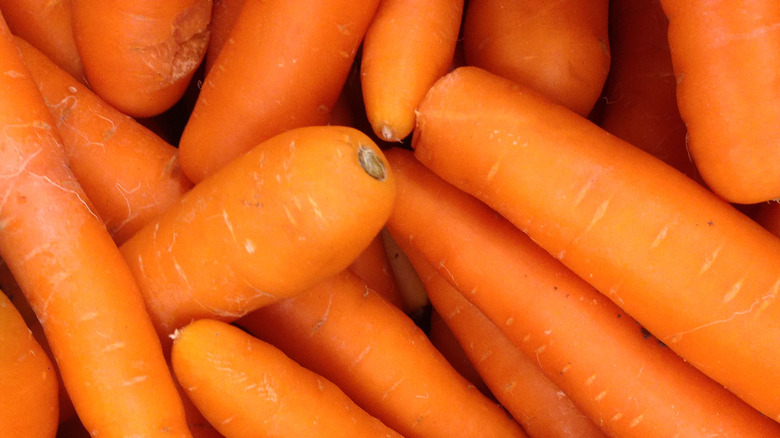Is It Bad To Eat Carrots At Night?
It's getting late, and you're just about to hit the hay — but what if you're feeling a bit peckish and want a quick and easy snack before bedtime? It's best to choose your late-night snack wisely, as some foods could make you more sleepy, but certain foods can actually keep you awake. "Some foods are downright energizing, and others can aggravate conditions like heartburn, indigestion, and acid reflux," nutritionist Lisa Richards told Eat This Not That! But what about carrots? Is it bad to eat carrots at night?
Carrots pack a slew of beneficial vitamins and minerals inside their sweet orange flesh (via WebMD). The crunchy carrot provides a healthy junk food alternative to chips and sugary or carb-laden late morning and afternoon snacks. These versatile veggies also make a perfect side dish or main course ingredient for lunch and dinner. Even with all their convenience and nutritional benefits, could eating carrots at night help or hurt your sleep cycle?
Carrots contain sleep-promoting nutrients
A 2014 study published in the Journal of Sleep Research looked into how nutrient and chemical levels in the body can affect sleep quality. The study determined low amounts of alpha-carotene, selenium, vitamin D, potassium, and others contributed to sleep disruption. Researchers found low alpha-carotene was the most significant contributor to difficulty falling asleep. Low vitamin D was associated with difficulty staying asleep, and greater daytime sleepiness was linked to low potassium.
High levels of beta and alpha-carotene give vegetables like pumpkin, squash, and carrots their orange color. Oregon State University outlines the nutritional content of carrots, noting that they contain the highest levels of alpha-carotene, second only to pumpkins. Because of their high alpha-carotene levels, eating carrots at night might help you fall asleep easier if you don't get enough carotene during the day.
Carrots also contain potassium at around 180 milligrams per serving, according to Drugs.com. Low potassium is linked to increased daytime fatigue, and it could also lead to difficulty staying asleep, according to LiveScience. While there are foods with more potassium, carrots' potassium content complements high alpha-carotene levels to potentially help you fall asleep and stay asleep. However, BioWellBeing advises cooking carrots, as cooked vegetables are easier to digest than raw vegetables. Foods that are difficult to digest can keep you up at night, warns the Ear, Nose & Throat Institute.


